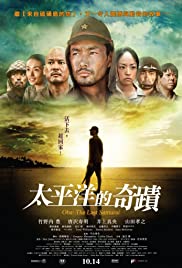
OBA: THE LAST SAMURAI
Japan, 2011, 128 minutes, Colour.
Yutaka Takamuchi, Sean Mc Gowan, Treat Williams, Daniel Baldwin.
Directed by Hideyuki Hirayama (English sections: Cellin Gluck).
Oba: The Last Samurai is a Japanese war film, made almost 70 years after the events, the fight on the island of Saipan in July 1944, the consequent year of American occupation, the end of the war and Japanese surrender, the refusal of the troops on Saipan to surrender until they received Japanese orders.
The focus of the film is Oba, a military commander, well disciplined, loyal, but also with something of a sense of compassion. This is especially seen in his leaving the ribbon to indicate to the Americans that there was a surviving baby and the Americans looking after the baby.
The film shows the bombardment of the Japanese, the many deaths. It also refers to the suicides on the cliffs of Saipan as families lined up from junior to senior and were pushed over the cliff to their deaths. The remaining troops decide to stay on the mountains for over a year and a half, refusing to believe eventually that the war had ended. Finally, they come down.
Oba becomes quite a sympathetic character, firm in his dealing with his men, also firm with the Americans but ultimately surrendering.
The screenplay, cowritten with Americans, is based on a history book by an American, Don Jones. This means that there is a sympathetic picture of the Japanese and their experience on Saipan but also look at the Americans, their incomprehension about Japanese honour, moves to understand them better and to negotiate some kind of surrender and peace. Sean Mc Gowan is the American soldier who understands the Japanese. Daniel Baldwin is the commander who is baffled by Japanese attitudes and behaviour while Treat Williams is much more sympathetic.
1. A Japanese perspective on World War II? The years of defeat, the battle of Saipan? The surrender? The group on Saipan that refused to surrender?
2. The title, the focus on Oba, his nickname of The Fox? Seeing him as a traditional Japanese warrior in the context of World War II? His leadership, control over his men, civilians, interactions with the Americans? The refusal to surrender? His needing orders? The Japanese authority giving the orders, his surrender?
3. The setting of Saipan, 1944, 1945? The island, the coast, the mountains? The American camp? The civilians? The action sequences, planes and bombings? The Northern Mariannas and the role in the bombing of Hiroshima and Nagasaki?
4. The explanation of the strategies, the Japanese troops and their moving back across the Pacific towards Japan, the Japanese living in Saipan? The Americans, invasion, bombings? Hand-to-hand fights? The Japanese fear of the Americans, the civilians being told that the Americans would torture and kill them – and the Americans trying to reassure the Japanese? The many reconnaissance parties?
5. The American troops, Lewis and his studying in Japan, knowledge of the language? His rebuking his driver for prejudice? His role with the military? The discussions with Pollard, Pollard not understanding the Japanese? The military decisions? His being replaced?
6. The change with Wessinger, his greater understanding, talking with Lewis, with the other men? With the Japanese, trying to make contact? His final meeting with Oba and the surrender? The discussions within the camp, the translator, the father wanting his daughters and going to the camp? The discussions and confrontations?
7. The picture of the Japanese, suffering under the bombardment, the deaths, the nurse and her bitterness, going up the mountain, to the caves, the lack of medical supply, her taking the soldier and raiding the supply, his being killed? Her surviving?
8. Oba, his men, their loyalty, the Japanese traditions, loyalty to the Emperor, rituals? The suicide of the generals? Oba in the camps, tying the ribbon for the survival of the baby, the baby being rescued and fostered, his finally holding it, in company with the nurse? A symbolic ending of peace after the war?
9. The Japanese soldiers, some fanatical, the violence, the man killing the translator?
10. The attempts at peacemaking, dialogue, resistance?
11. The bombings in Japan, the surrender, the soldiers thinking it was American propaganda, their holding out for months on the mountain?
12. Oba finally receiving the orders, coming down, the discipline of the men, the sword, laying it on the table, the surrender?
13. The American contribution to the film? A film of Japanese history?